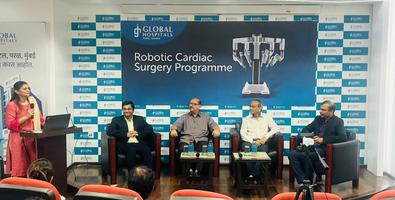Find official statements and press releases from Gleneagles Global Hospitals. Follow us and visit us for our official position, bulletins and other news. All press releases will be available here for public consumption and media reference.
- Read moreNov 7, 2023Mumbai, Parel
Gleneagles Hospital Hand Transplant Recipients Ready To Participate In The Tata Mumbai Marathon 2023
Gleneagles Hospital Takes Initiative to Raise Awareness About Organ DonationMumbai 11th Jan 2023: The Gleneagles Hospital is proud to… - Read moreOct 27, 2023Mumbai, Parel
Western India’s Youngest Child With A Non Compatible Blood Group Undergoes Liver Transplant
5 month old infant suffering from tyrosinemia with liver failure underwent a successful ABO incompatible liver transplantMumbai,… - Read moreOct 27, 2023Mumbai, Parel
Gleneagles Hospital Hand Transplant Recipients Ready To Participate In The Tata Mumbai Marathon 2023
Gleneagles Hospital Takes Initiative to Raise Awareness About Organ DonationMumbai 11th Jan 2023: The Gleneagles Hospital is proud to… - Read moreOct 27, 2023Mumbai, Parel
33-year-old Rajasthan man becomes first in Asia to successfully undergo Bilateral Total Arm transplant in hope of leading an independent life
12-Year-Long Struggle to Lead an Independent Life EndsA 33-year-old Rajasthan man who lost both his hands in an electric accident 12… - Read moreJun 27, 2023Mumbai, Parel
Gleneagles Hospital, Parel Launches Revolutionary Robot-Assisted Heart Surgery Program
Mumbai, 27th June 2023: Gleneagles Hospital, Parel, Mumbai, is proud to announce the launch of its new Robot-Assisted Heart Surgery… - Read moreJun 16, 2022Bengaluru, Kengeri
Gleneagles Hospital, Kengeri crosses 250+ Liver Transplant
Thursday, June 16, 2022: BGS Gleneagles Global Hospital is one of Karnataka’s leading multi-organ transplant centres. It has the… - Read moreJun 16, 2022Bengaluru, Kengeri
BGS Gleneagles Global Hospital - First In Karnataka To Touch The 250 Liver Transplant Mark
First to complete 250 liver transplants in Karnataka First to perform adult swap liver transplant in Karnataka First to perform Multi… - Read moreJun 3, 2022Mumbai, Parel
First Small Bowel Transplant Patient Of Mumbai Embarks On A New Journey
Gleneagles Hospital Parel Gives New Lease of Life To A 46 Year Old Patient Hailing From KolkataKey Facts12 surgeries conducted in…







